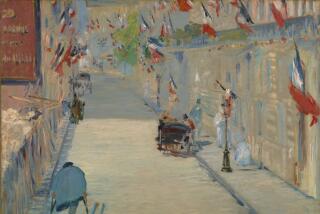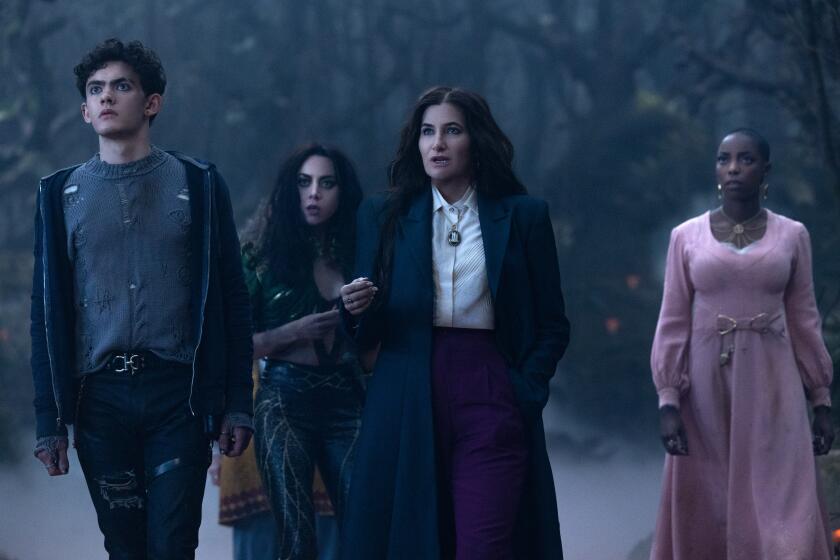Book review: ‘And the Show Went On: Cultural Life in Nazi-Occupied Paris’ by Alan Riding
And The Show Went On
Cultural Life in Nazi-Occupied Paris
Alan Riding
Alfred A. Knopf: 400 pp., $28.95
A lot has been written about the political, social and moral aspects of France under German occupation in World War II. Alan Riding, the former longtime New York Times cultural correspondent in Europe, now provides an arresting and detailed account of the French arts scene at the time.
“And The Show Went On” is a big story and insidiously troubling. Big because, in 1940, France was the world’s art capital; unquestionably in painting, and to a large extent in film, music and literature. Troubling as a reflection of what was happening in the country as a whole. The German triumph was not just a defeat; it caused a collapse.
Ever since the revolution, France had been torn, sometimes bloodily, between rival ideas of herself: right against left or, with more nuance, traditional versus progressive. Marshal Pétain, who surrendered the army to the Germans and took over as their increasingly controlled proxy, belonged to the anti-Republican right; so did his supporters.
Pétain’s initial acceptance by most of the French was a result of war weariness and the evidence that their politics as well as their army had miserably failed. More than anything, though, it was from the hope that Pétain and his Vichy establishment could put a French stamp on the German presence, acting in some sense as an intermediary; and that life, even humiliated, would go on (except for the Jews, that is). Increasingly, as the Resistance took hold, and the Germans waged savage reprisals and occupied the rest of France, the hope proved vain and the old marshal a malevolent dodderer.
In the world of the arts, things were much the same. There were a small number of active collaborators along with a few right-wing fanatics: among them such writers as Céline, Pierre Drieu La Rochelle and Robert Brasillach. There were valiant holdouts: the conductor Paul Paray who quit his orchestra to protest the purging of Jewish players, and Josephine Baker who, almost alone among nightclub entertainers, stopped performing and eventually joined the Resistance (smuggling messages in her underwear). René Char not only stopped writing; he went south to lead a large Maquis (rural resistance) detachment. Most, though, occupied the life-must-go-on middle ground.
Riding’s most valuable achievement is in exploring this middle ground. He is rarely judgmental as he writes of the accommodations many made: What he does is shine a humane light upon the complexity of their choices. Music hall performers and classical musicians did not stop playing because German soldiers thronged the theaters; neither did actors at the Comédie-Française. Going to Germany, as Maurice Chevalier and Charles Trenet did was another matter, even though both did their performing for French POWs.
Accustomed to being invited to brilliant society parties, many stars — actors, writers, musicians — kept on going even when the guests included high-ranking Germans. The film actress Arletty not only went to the parties; she took trips with her German officer lover. “My heart is French,” she announced defiantly to a post-liberation trial, “but my ass is international.”
An additional complexity was that although Joseph Goebbels demanded that France’s arts be subordinated to Germany’s, many of the Germans in Paris as enforcers and censors were cultivated men who greatly admired French culture. The German ambassador to Vichy, Otto Abetz, would sometimes intervene to help artists in trouble with the authorities. When German officials banned the singing of “La Marseillaise” in one of his plays, Sacha Guitry appealed to a ranking German general. Not only did the general revoke the ban; he and his aides attended the performance and rose for the singing. German officers would visit Picasso’s studio even though some of his paintings were being burned as decadent. A much-told story has one officer holding up a “Guernica” reproduction and asking: “Did you do this?” Picasso, polite but scrupulously aloof, replied: “No, you did.”
Riding, with his journalist’s background, can sometimes cram in a fact too many, but his weighing of the complexities of the time is splendidly shrewd. And the sections dealing with writers are a triumph (granted, they provide better quotes). The post-liberation writers’ purge committee, sniffing out evidence of collaboration, rebuked some for publishing in the Vichy-controlled press. It was the only press around. André Gide and Paul Valéry, without a collaborationist bone in their bodies, briefly wrote for the Nouvelle Revue Française even after Gallimard turned it over to a pro-Vichy editor. Sartre and Camus both published. The brilliantly waspish columnist Jean Galtier-Boissière denounced the holier-than-thou attitude of the purgers (some of whom had also published): “One forgets that some of them had only their pen with which to feed their family and wrote only anodyne pieces. Does one reproach the workers at Renault for making tanks for the Wehrmacht?”
The essayist Jean Guéhenno, refusing to publish, was equally waspish in denouncing those who did:
“The species of the man of letters is not one of the greatest of human species. Incapable of surviving for long in hiding, he would sell his soul to see his name in print. He can stand it no longer. He quarrels only about his importance, the size of the print in which his name appears, its ranking in the table of contents. It goes without saying that he is full of good reasons.”
Disputation is France’s oxygen, and Riding breathes it exuberantly.
Eder, a former Times book critic, was awarded the Pulitzer Prize for criticism in 1987.
More to Read
The biggest entertainment stories
Get our big stories about Hollywood, film, television, music, arts, culture and more right in your inbox as soon as they publish.
You may occasionally receive promotional content from the Los Angeles Times.










